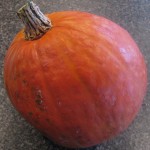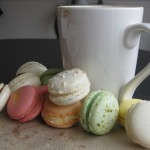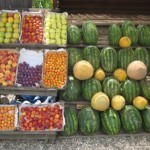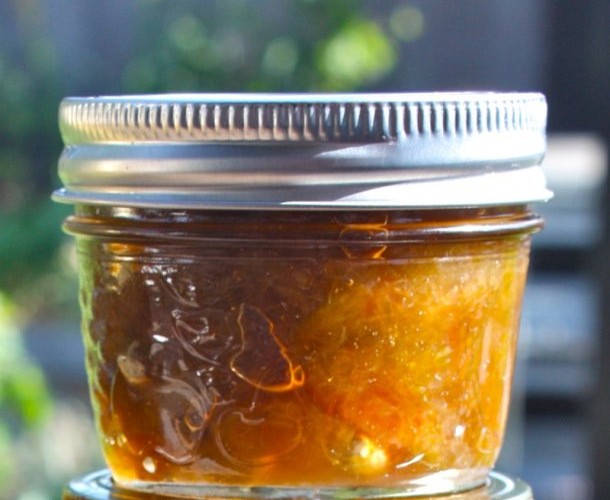The ritual upon my arrival at Pava’s home.

Together, we tour her spectacular garden. She celebrates her labours of love, and I earnestly “œooh” and “œaah” over everything ““ effortlessly. I am still in awe. Here she is being silly in front of their home since 2002 in Bijeljina, Bosna. It is interesting to know that both Pava and Petar were orphaned at 10 years of age during the second world war. Though they never met until years later, their stories are similar. Each stayed with their brothers and sisters. Pava was the youngest, and Petar the oldest, thus each played very different roles within that intimate family unit during that very difficult time in history. Suffice it to say, that once they met, each had a truck load of intestinal fortitude, and understood one another implicitly. Family was always to be first and foremost in each of their hearts. Both worked hard, as that is all each knew. She, a kindergarten teacher; he, a financial planner. They owned their apartment in Lukavic, and had just completed a dream country house. Two story brick with an indoor and outdoor kitchen. Nut and fruit trees, grape vines, flowers”¦ life was good, and they deserved good.
Then, came the Bosnian war. Again, suffice it to say that they left their home, and moved into another vacated home in a safer area. Once the war was over, they reclaimed their home, and in time, repossessed it. They could no longer live there, so they sold it. Their country home was unsalvageable at this period of their life. They moved to Bijeljina, inside of the Republik of Srpska in Bosna. Eventually, they found this lovely little cement home on this lovely piece of land to purchase and moved it to start over again. If anyone knew about starting over, it was Pava and Petar. Always positive, always happy, always working Together, they created a paradise for themselves in 7 years. It is a little sad to see how hard they do work. We could certainly provide an easier life for them, but they will have none of of that kind of change.
This home is again created by their own hands, and one can only guess at how much that means and how difficult it would be again, to lose. So, a little walk with me and Pava through her Garden of Eden”¦.
She has a special variety of black berries that grow like grapes do, in clumps, and are more full flavoured than the ones I am used to at home. These are not ripe yet, but look good enough to eat right now!
There is the wall covered with them. And Pava is giving Lori one of her cucumbers to take home with her to Belgrade. Vanja wanted to be sure I noted that everything is bigger in the Balkans.
I am standing under the grape vines photographing them from the inside, but the light is still too bright! Look at how plentiful these are. They are not good eating grapes. They turn a nice red colour, and Pava makes juice from them for the winter.

See the grape vines beside the fence staked up with the two boards? They are huge. To the right of them are the peach and pear trees and the columnar apple trees. To the left, the blackberries. All are difficult to see against the green corn in the neighbour’s yard.
These she did not plant, they are actually growing wild in the lane. They are wild plums and a signature fruit of this region primarily because of the plum brandy everyone distils at home. They can make it with these plums, and many do. They are really tasty fruit. The yellow one is more full flavoured with a very tart skin, and the red one has subtler flavour and a sweet skin. These would make great preserves, pudding, dried fruit, and a whole host of other things! Pava has used them in almost any way possible, particularly through the last war.
She has columnar apple trees hiding behind the nasturtium, pears, and nectarines in her front yard.



Two bulging apricot trees are in her garden in her side yard planted only two years ago!
The cherry tree is at the back of the house, as is the red current, the strawberries, and most of her herbs: thyme, sage, and other medicinal herbs. She makes teas with them all for the winter and knows exactly which combination will cure which ill. I have a cupboard filled with them at home with little loving notes attached to each so we use them properly.
Her garden is also at the side of the house filled with cucumber, tomatoes, onion, carrots, peas, squash, zucchini, potatoes, dill, and so much more. I found this eggplant blossom adorable, and did resist plucking the eggplants to make the smoked eggplant dip, but it was hard!

Look at this massive squash! This is for Lori to take home. Our pita for lunch was made with one, but I could only taste the cheese; it was delicious!
The morning glory vine is against the smokehouse beside the cement outdoor sink. Everyone has an outdoor sink. Even in the city, if they live in a house. The basil is everywhere, and all kinds. See the little topiary of it, and behind it, so much sweet basil. The smoke house is used in the winter to smoke the most outstanding pork. It is cured like prosciutto, but it is smoked and a specialty of the region. Everyone has their own way, and everyone does their own, even if they live in an apartment. If they don’t have their own smoker, they use someone’s. The smoked meat and sausage of this region is absolutely deadly delicious, and I do not even eat meat!
More from the garden I had to show everyone!
Where does Pava keep all of her food for the winter? In her shed. It is attached to the outside garage where the fire burning stove is, and this is always our last stop on our tour. She has started already for this winter, of course. Apricot jam, tomato preserves, all kinds of juices and winter salads, and of course, ajvar. Ajvar is seen to be cooking over open fires all over Bosnia in late summer and the fall in massive pots, yet it is so delicious, it is rare to have any left by Christmas. Pava saved her entire stock from last year for me. I make it, too, but there is nothing on Earth better than Pava’s Ajvar.
Here she is showing it to us. It took a lot of self control not to whip it out of her hand and savagely have at it that very second! I pride myself on my control! Then there are her yellow peppers and her hot peppers”¦.
She showed me how many bottles of cherry juice she had already made this spring, and that begged the question: “œWhere is your Cherry Sliva?” The men usually drink it straight, but Pava sneaks a little, soaks her cherries in it, and creates a delicious (though still deadly) concoction to sip on. She started to grin and pulled out her jug of it!

And look what she made for her son”¦. Can you see that love in her eyes? It is pretty obvious, isn’t it?
Vanja had enough, so decided he would take a turn and show me his beer. Time for a break! No, one more minute, Pava whispers. “œLook what I have hidden and saved just for you?”

An entire kilo of walnuts! Oh, my goodness! Vanja’s Uncle Vulcan brought them 2 kilos from his property when he came to visit over the winter, so she saved one for our visit. That’s Pava, the ultimate saver. There are walnut trees throughout the region, yet they are still very expensive in the stores, and almost all of the traditional sweets call for them.
And there is the shed, still mostly empty. Important tidbits in bags hung from the ceiling. Mother crying on her son’s shoulder one more time to let him know how much he was missed and to instil that little bit of loving motherly guilt within him as she mumbles through her tears that she is so happy to be together with the family one more time while she is still alive.
I have come to know this as part of who Pava is, and part of what is expected from all “œgood” mothers of the region.
And she is the quintessential mother. She wastes nothing. Uses everything. Works very hard, and takes great pride in it all, as she should. Those struggling to provide for themselves working at the 100 Mile Diet might learn something from a trip to this area. The 100 meter diet is basically the way of life here. They grow their own, and raise their own, and make everything themselves. And life is good.
I do feel at home here. Who wouldn’t? It is a paradise for a gardener, and a cook. (Though I do miss my kitchen at home.) This is definitely an adventure and a challenge I am eager to take on every time I come!
Who needs to shop? Just go outside and get what you need. It is all here. Only the bread and milk is purchased in this home, and in many others nearby, even that is made from the field in the house.
This country is full of contradictions. Where the 100 Mile Diet is the way of life for all in the rural areas, the nouveau riche are revelling in their new found ability to buy processed, buy foreign, and just “œbuy”. The deep appreciation many are just beginning to acquire at home for local regional produce is the way of life many are trying to escape here. The new Mega Markets popping up throughout the land everywhere offer much more variety than has ever been possible in stores here before. The transition in this country has been phenomenal in the past five years.
I wonder if they know what a good thing they really do have going. Then again, this way of life is a matter of survival, not choice, for most. That makes all the difference, but the 100 metre diet is a beautiful thing to me.

















































this truly is a garden of eden. promise me next time you go, TAKE ME!!! i could be VERY happy among the apricots, tomatoes, blackberries and grapes. YUM! sounds like paradise to me.
Life is amazing in so many ways. Hardship is a part of everyone’s reality regardless of how much one has in the way of money and material things. One’s difficult times is never worse or better than anyone elses. Often hardship is a time of great growth and the blossoming of inner strength beyond our imagination. The smile in Pava’s eyes says volumes. Hard times and struggles are life’s biggest lessons. At the end of the day all that really matters is family and friends.
Whew, I need to go rest now. 🙂
I could relate to so much you wrote in this post; it is a way of life for many in Lebanon, too, more out of necessity of course; in the villages, the only ones left are the elderly, still toiling until the end. The human need for consumption is causing this split between the old way of life and the new, technologically- driven one. I saw in the most remote areas in Lebanon kids on their internet and blackberries, while their parents and relatives are trying to make a living out of the land.
building and rebuilding, all too comment in that part of the world. You are the best daughter in law she could hope for, and that is a big comfort.
Joumana… yes, it is the same. So hard to believe that all of the children have cel phones and nothing else. Live in one room homes and eat very little variety.
Such disparity.
XO